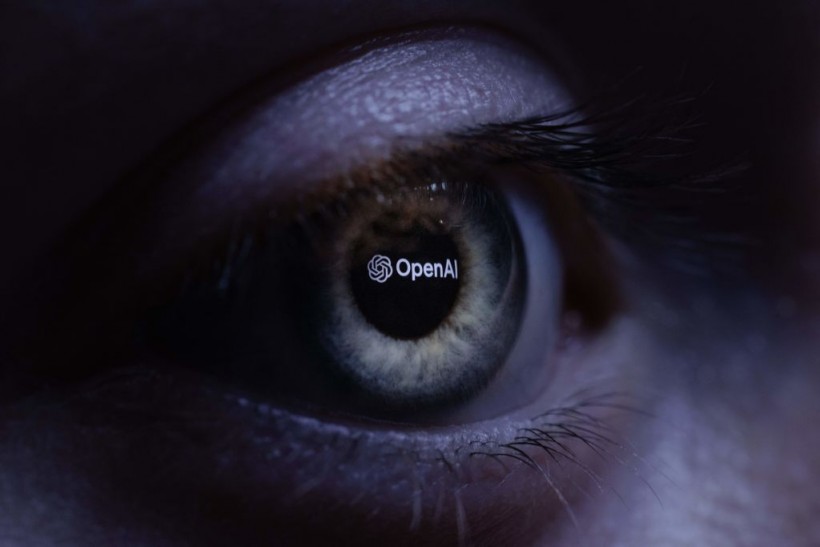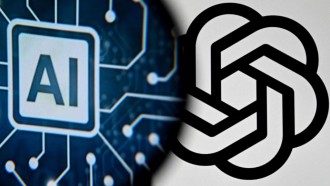A year ago, the concept of carrying a meaningful conversation with a computer seemed like something out of a science fiction story. However, with the launch of OpenAI's ChatGPT, the world has witnessed rapid advancement in artificial intelligence (AI) technology, transforming our lives and work in ways previously unimaginable.
Whether this AI-driven plot unfolds as a tale of progress or a dystopian nightmare ultimately depends on the individuals who help shape it.

(Photo : JOEL SAGET/AFP via Getty Images)
This illustration photograph taken with a macro lens shows an 'OpenAI' logo reverse projected onto a human eye at a studio in Paris on June 6, 2023.
Steering the Narrative
Fortunately for us, as AI continues to evolve, so does the diverse cast of people involved in building and studying it. While the AI community has been predominantly male, recent years have seen efforts to make it more inclusive and welcoming to women and other underrepresented groups.
The field now comprises leaders, researchers, entrepreneurs, and activists who are not solely focused on algorithms and profits but also consider the ethical and societal implications of this technology. This shift has been primarily led by women, driving a movement that seeks to address the broader impact of AI.
Read Also: Europe to Establish Massive AI Test Facilities Worth Over $200 Million
Women Visionaries Shaping AI
Rumman Chowdhury
A prominent figure is Rumman Chowdhury, who led Twitter's ethical AI research until Elon Musk acquired the company and disbanded her team. Chowdhury is now the co-founder of Humane Intelligence, a nonprofit organization that uses crowdsourcing to uncover vulnerabilities in AI systems. Through contests challenging hackers to induce bad behavior in algorithms, the organization aims to shed light on the potential risks of AI.
Their first event, supported by the White House, will focus on testing generative AI systems from companies like Google and OpenAI. Chowdhury believes that large-scale, public testing is essential, as the societal impact of AI requires input from a diverse range of experts.
Sarah Bird
Sarah Bird, who works at Microsoft, plays a crucial role in ensuring that the generative AI integrated into the company's products remains on the right track. As AI text generators become more powerful and useful, they also pose a risk of generating biased content and harmful code. Bird's team works diligently to contain these negative aspects of AI. She emphasizes that AI's potential to improve lives can only be realized if people trust that it will not produce stereotyped outputs.
Yejin Choi
Yejin Choi, a professor at the University of Washington, is focused on developing an open-source model called Delphi, which aims to incorporate a sense of right and wrong. Choi is interested in understanding how humans perceive the moral pronouncements made by Delphi. She advocates for AI systems that match the capabilities of those developed by OpenAI and Google but do not require extensive resources.
According to Choi, the current emphasis on scale is problematic, concentrating power excessively and making the technology prohibitively expensive. She believes diversity in AI development is crucial for a more inclusive and equitable future.
Inioluwa Deborah Raji
Inioluwa Deborah Raji, who initially worked on projects identifying bias in facial analysis algorithms, has seen firsthand the harm caused by AI systems. Her research revealed that such algorithms exhibited the lowest accuracy when analyzing images of women with dark skin.
As a result, tech giants like Amazon, IBM, and Microsoft ceased selling face-recognition technology. Raji is now collaborating with the Mozilla Foundation on open-source tools that empower people to assess AI systems for flaws like bias and inaccuracy, including large language models. These tools enable communities affected by harmful AI to challenge powerful tech companies by providing evidence of the harm they cause.
These women represent just a fraction of those contributing to the AI narrative. Their work highlights the importance of diverse perspectives in building AI technology that serves society's best interests. As we move forward, it is crucial to continue fostering inclusivity, ethics, and transparency to ensure that the plot of AI's influence on our lives unfolds in a positive and empowering manner.
Related Article: EU Introduces 'Crash Test' Systems for AI to Ensure Safety






